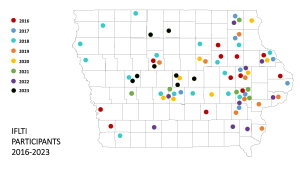3 Subsequent Sessions
Over the next six years, 72 additional participants completed the Training Institute. Most participants completed the training once begun. Trainees were selected based on:
• Cross-diagnosis representation
• Urban/rural distribution
• Ethnic, economic and cultural diversity
• Previous training or community engagement
• Readiness to participate.

All participants were the parent or primary caregivers of a child or youth between the ages of 2 and 19 years old. Most participants were women; however, two men have participated, and an additional father served as a mentor. An Arabic interpreter joined the 2017 training, and the written materials were translated into Arabic. Three Hispanic mothers joined the training in 2021, and a Spanish interpreter was provided, materials translated into Spanish, and 3 way video interpretation provided for the mentoring relationship. Stipends were provided for those who identified financial stressors.
Recruiting required focused effort. Parents are busy, often do not detect leadership qualities in themselves, may struggle with committing to a four-month-long training, and may not have enough support to attend an overnight training. Often parents need a personal invitation to enroll and encouragement to sustain involvement. Invariably they are motivated by the shared experience of training. All the cohorts have developed private Facebook pages to continue communication. The Institute also maintains a Facebook page.
The 2020 session of IFLTI launched in March with 10 trainees. Within two weeks, COVID-19 bore down on the state, and all in-person trainings and meetings were cancelled. IFLTI staff, in consultation with trainees, converted to virtual trainings for Sessions 2, 3 and 4. Four trainees withdrew from the training due to increased family responsibilities or health concerns. Those who remained reported barriers to making progress on Community Service Projects. In time, trainees modified their projects or adjusted goals to reflect restrictions imposed by the pandemic. Focus of the training shifted to identifying personal leadership growth and maintaining wellness. An in-person “reunion” was held in January 2021 when health conditions allowed.
Project staff received feedback from some potential participants that they were unable to attend the full training due to unpredictable work schedules or unreliable transportation. With funding from the National Network of Libraries of Medicine, Greater Midwest Region, modules from the training were delivered in two-hour-long, evening trainings in communities around the state. Local Family Navigators recruited participants for these trainings and co-presented with an Institute trainer. Topics included finding reliable health resources, communication, advocacy, and family-centered care.
In order to continue engagement with former participants, continuing education opportunities were offered through evening webinars. Topics included Adverse Childhood Experiences and legislative advocacy. Presenters were state and local leaders and previous mentors. In 2019, a former participant volunteered to produce a newsletter for graduates of all cohorts. The newsletter editor task transferred to staff in 2022.
